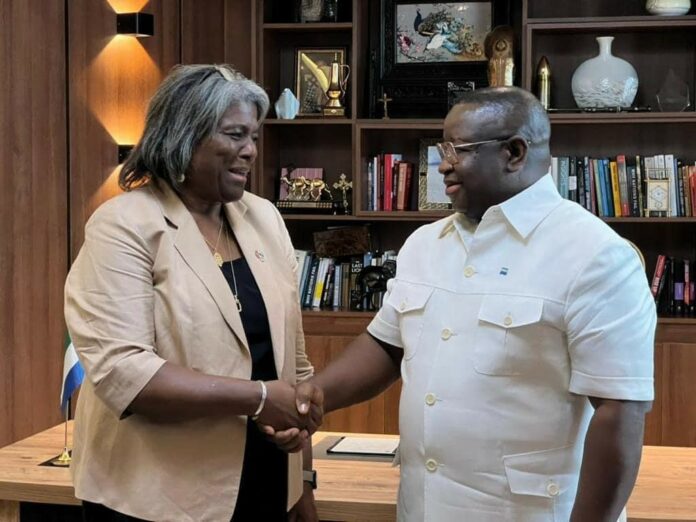By Ibrahim Mansaray
The United States Permanent Representative to the United Nations says that their government is not pushing for rerun elections in Sierra Leone. Ambassador Linda Thomas-Greenfield was speaking at a digital press conference held on Wednesday, January 31 2023 where she discussed her recent visits to three countries in the West African sub-region – Liberia, Sierra Leone, and Guinea. Thomas-Greenfield denied having any knowledge of such, asserting that the US has certainly not called for that.
“I’m not aware of that, but what I am aware of is that the $1.5 million will assist Sierra Leone in developing their plans for how they will conduct elections in the future. But there are no – as far as I know, there are no plans for an election, and certainly we have not called for that”, she said.
In the diplomat’s recent touchdown in Sierra Leone, she pledged $1.5 million in support of legal reforms in the country. A rerun election was one of the demands of the main opposition party All People’s Congress (APC) which disagreed with President Julius Maada Bio’s second term and subsequently boycotted governance until a mediated dialogue by the Commonwealth and other local and international partners got them to reverse their decisions through a ‘National Unity Agreement’.
The elections that gave Bio a second term in office were marred by a lack of transparency according to the European Union and the Carter Center elections observers mission, and the results were statistically improbable according to the National Elections Watch. The US through Secretary of State Anthony Blinken consequently announced visa restrictions targeting an unnamed group of people who were said to be responsible for undermining democracy in Sierra Leone. The Presidential Spokesman Alhaji Alpha Kanu argued that the visa restrictions do not apply to government officials but the public affairs officer at the United States Embassy in Freetown Sarah Vanhorn confirmed that it does.
It’s still unclear whether the sanctions are still in force or they have been reversed, but the US government is still showing its commitment to supporting Sierra Leone’s democracy. Greenfield said democracy is the basis for the funding she announced in Freetown. “This funding will help provide the technical and legal assistance needed to strengthen democracy in Sierra Leone – as well as fuel civilian engagement to increase everyday people’s awareness, buy-in, and ownership”, she added.
National unity is another goal she said they are working with the government to achieve as she expressed their commitment to establishing a path forward and building a unified country in the interest of all. Another theme of Thomas-Greenfield’s visit to the subregion, she said, was peace and security as part of democracy. She said this was the focus of the engagement she had with the leaders including President Bio whose country just joined the Security Council. President Bio wrote on X that useful discussions were held on “strategies for enhancing the longstanding bilateral and diplomatic relations that exist between the United States of America and Sierra Leone.”
She elaborated on the AU financing resolution which was led by Ghana and passed late last year to support peace and security in Africa. The resolution, she said, underscores the primacy of politics and the need for a coherent political strategy that will guide any peacekeeping operations. Additionally, it places African leaders at the forefront and the people at the center of security issues. Among others, It also provides for 75% of UN funding of peacekeeping operations for African Union missions.
The last theme of the US diplomat’s visit is investing in the future of Africa, namely women and young people. Thomas-Greenfield met young women leaders to discuss their transformative role in politics. This included women in government, their counterparts in opposition parties, and others in academia and advocacy. She also visited Tombo Fishing Village, where she learned more about the community’s challenges with illegal fishing, as well as U.S. interventions to address climate, health, food – and food security.


